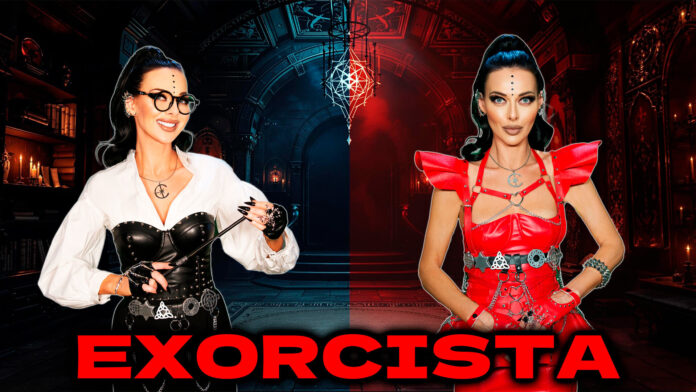The candles flicker on screen as Victoria Unikel whispers ancient incantations into the camera. Within minutes, hundreds of viewers flood her inbox with comments, questions, and testimonials about how her spells have transformed their lives. Three months after launching her show Exorcista™️, the award-winning artist has already amassed 86,000 YouTube subscribers—and she’s far from alone in capitalizing on what industry analysts are calling the most unexpected business trend of the decade.
In boardrooms across America, executives who once dismissed the occult as fringe are now scrambling to understand why tarot card sales have surged, why “witch” merchandise on Etsy is in the hundreds, and why the U.S. psychic services industry has ballooned into a $2.2 billion market. The answer lies at the intersection of economic anxiety, spiritual hunger, and a generation of entrepreneurs who’ve discovered that in uncertain times, selling certainty—even supernatural certainty-is perhaps the most lucrative business of all.
The New Prophets of Profit
Victoria Unikel embodies this new breed of spiritual entrepreneur. By day, she’s a media mogul whose companies, including VUGA Media Group, VUGA Enterprises Network, and 24Fashion TV, command audiences of 65 million monthly visitors. By night, she transforms into Exorcista™️, teaching viewers to cast money spells, perform protection rituals, and—most importantly—purchase her soon-to-be-released line of enchanted products.
“I use magic in my life for health, wealth, and success,” Unikel declares on her website, a statement that would have been career suicide a decade ago but now reads like a master class in modern marketing. Her show doesn’t merely entertain; it leads people through a self-help process to enact their own transformation, tapping into what Dr. Maria Carolina Zanette of NEOMA Business School identifies as a fundamental shift in consumer psychology.

Victoria Unikel in Exorcista show. Episode cover image on the true story behind The Exorcist movie
For Unikel, the occult isn’t merely a marketing angle—it’s the foundation of her empire.
She claims to have discovered her ‘powers’ when she was five years old, and that her grandmother initially taught her to read the signs. “I’ve known the power of magic since I was five years old, when my grandmother first taught me to read the signs,” she reveals in a rare moment of vulnerability. “But everything changed after graduating from a top music college program. I performed a ceremony asking the universe for success, for a path forward. Very soon afterward, I got my first modeling contract and bought my first real estate.”
She continued to grow creatively and entered a top drama school at 20. Her early filmography bears this out: by 2002, she had appeared in Russian television series such as Villisy, Stilet, and played the starring role in the crime drama series Dasha Vasileva. “People think success is about luck or connections,” Unikel continues, her voice dropping to a near-whisper. “But I know the truth. When you align yourself with ancient forces and respect the old ways, doors open that were never there before. Every major breakthrough in my career—from my first international film role to building my media empire—came after meditation and ritual. The occult isn’t something I do; it’s who I am.”

Victoria Unikel at Entertainment Weekly party during Sand Diego Comic-Con
The entertainment industry recognized this lucrative trend long before individual entrepreneurs, from Elvira Show to Wicked. Over the past fifteen years, Hollywood has conjured billions from the public’s collective fascination with the occult. The Harry Potter franchise alone has generated over $25 billion across films, merchandise, and theme parks, with its eight movies earning $7.7 billion at the box office. Since 2010, the screens have been flooded with witch-centric content: from prestige horror films like The Witch and Hereditary to series like American Horror Story: Coven, The Chilling Adventures of Sabrina, Maleficent, and a Charmed reboot. Netflix now maintains an entire category dedicated to “Witchcraft & the Dark Arts.” Even children’s entertainment has been thoroughly enchanted—Barnes & Noble stocks over 4,600 products under “New Age & Alternative Beliefs,” while the New York Times regularly reviews middle-grade novels featuring young witches wielding “magic that feels hungrier and darker.” This normalization of the occult in mainstream media hasn’t just reflected cultural shifts; it’s actively shaped them, transforming witchcraft from taboo to trend, from feared to financialized.
“The witch is on a journey from ‘evil’ to ’empowering,'” Zanette observes in her research on occult branding. This reframing has opened floodgates for businesses willing to embrace the mystical. Major brands from Anthropologie to Jägermeister now feature palmistry graphics, tarot imagery, and witchcraft themes in their product lines. The Shutterstock 2020 Creative Trends report documented a 525% rise in searches for “magic” and 289% for “spiritual”—numbers that suggest this isn’t a fad but a fundamental market realignment.
Fear, Fortune, and FOMO
For entrepreneurs navigating post-pandemic uncertainty, the occult offers something traditional business strategies cannot: a sense of control in chaos. Michael Cardenas, owner of Olde Ways in San Diego, charges premium rates for his spellwork services, understanding that his clients aren’t just buying candles and herbs—they’re purchasing hope.
“Often during times of political turmoil, people turn to witchcraft and alternative spirituality,” explains Pam Grossman, author of “Waking the Witch” and host of “The Witch Wave” podcast. But there’s another factor at play: the quintessentially American belief that spirituality and capitalism aren’t just compatible but complementary.
This fusion has created what Professor Joseph Blankholm of UC Santa Barbara calls a perfect storm of “on-the-go” spirituality that fits better within our economy.
Unlike traditional religious institutions that demand regular attendance and communal participation, modern occult practices can be customized, commodified, and consumed on demand. A spell for prosperity here, a protection ritual there—all available for the right price.
The Numbers Don’t Lie (Even If the Crystal Ball Might)
The financial success of spiritual businesses defies conventional wisdom about market rationality. Patanjali, the Indian spiritual brand, generates over $2 billion annually. The global spiritual and religious market in India alone exceeds $30 billion. In Australia, businesses catering to the 22,000 citizens who identify as Wiccan or pagan have created a thriving cottage industry. On TikTok, #witchtok has garnered over 5.3 billion views, each one a potential customer touchpoint.

Victoria Unikel live stage performance in Berlin
What makes Unikel’s Exorcista™️ particularly instructive is its rapid growth trajectory. Gaining 90,000 subscribers in under three months suggests she’s cracked a code that eludes many traditional content creators. Her formula? Blend ancient mysticism with modern media savvy, promise results just like most self-help book writers and speakers, promise tangible results, and never apologize for the commercial aspects of the spiritual.
“Witches have been compensated for their services for thousands of years,” Cardenas notes, pushing back against critics who claim commercialization corrupts spiritual practice. This historical precedent provides cover for modern practitioners to charge premium prices without guilt—after all, they’re simply following ancient tradition.
The Shadow Side of Success
Yet this boom raises uncomfortable questions about authenticity, exploitation, and the commodification of belief. When spirituality becomes a product, when ancient practices turn into Instagram content, and when the sacred becomes sellable—what’s lost in translation?
The answer may matter less than the market reality. As economic uncertainty persists, as traditional institutions continue to lose credibility, and as younger generations seek meaning outside conventional frameworks, the business of belief will only grow. Companies that once mocked such trends now hire consultants to help them tap into “spiritual marketing”—a term that would have been oxymoronic a generation ago but now represents cutting-edge strategy.
The Bottom Line Gospel
For business leaders watching their traditional markets stagnate, Unikel’s success offers a lesson that transcends the supernatural: in an economy of attention, selling transformation beats selling products. In an era of anxiety, offering control—even illusory control—commands premium prices. And in a culture increasingly comfortable with paradox, the marriage of mysticism and money isn’t just acceptable; it’s aspirational.

Victoria Unikel playing cello at Gnessin Music College
The real magic of Exorcista™️ and similar ventures isn’t in the spells they teach or the rituals they sell. It’s in their recognition that modern consumers don’t just want products—they want purpose, community, and the promise that their purchase might somehow change their destiny. In a world where traditional paths to prosperity feel increasingly out of reach, is it any wonder that millions are willing to try a different kind of magic?
As you close this article and return to your spreadsheets and strategy meetings, consider this: while you’ve been focused on disruption and innovation, an entirely different force has been reshaping the marketplace. The witches haven’t just come out of the broom closet—they’ve set up shop, scaled up, and shown that sometimes the oldest business model of all—selling hope—remains the most powerful. The question isn’t whether you believe in magic. The question is whether you can afford to ignore a multi-billion-dollar market that does.




